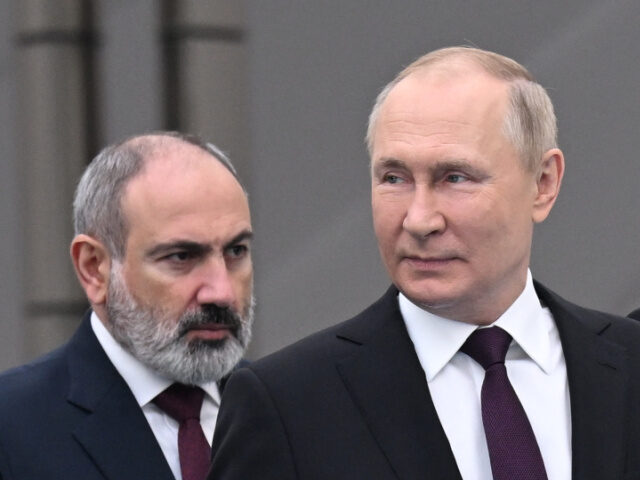Armenian Prime Minister Nikol Pashinyan said on Wednesday that his country will withdraw from the Collective Security Treaty Organization (CSTO), a Russia-dominated security bloc that includes the former Soviet territories in Central Asia.
Armenia is furious with Russia because it allowed majority-Muslim Azerbaijan to commit ethnic cleansing against the Armenian Christian residents of the disputed Nagorno-Karabakh region.
Nagorno-Karabakh, which Armenian residents referred to as the “Republic of Artsakh,” is an autonomous region in the mountainous border between Armenia and Azerbaijan. When the Soviet Union fell, Artsakh wound up on the Azeri side of the border, even though Armenians had lived there for hundreds of years.
A 30-year struggle for control ensued, occasionally flaring up into military conflict. Armenia lost a war with Azerbaijan in 2020, but Artsakh survived until 2022, when Azerbaijan imposed a blockade of the only road leading from Armenia into the disputed territory. A massive military invasion by Azerbaijan sealed the fate of Artsakh a few months later and conquering Azeri forces quickly forced out the Armenian Christians, driving thousands across the border as refugees and seizing the property they left behind.
This became a major source of tension between Armenia and Russia because Moscow brokered the truce that ended the 2020 war and agreed to deploy “peacekeepers” in Nagorno-Karabakh. The Russian “peacekeepers” proceeded to stand idly by while Azerbaijan blockaded, starved, crushed, and ethnically cleansed the entire region.
Armenia has long been allied with Russia. It joined Kazakhstan, Kyrgyzstan, Tajikistan, and Uzbekistan in signing the Tashkent Pact or “Collective Security Treaty” in 1992, establishing the CSTO as a mutual security alliance dominated by Moscow. The CSTO was substantially upgraded and expanded in 2002, as Russia strove to create its own version of the North Atlantic Treaty Organization (NATO).
None of the CSTO nations was ever a military power on par with the NATO allies, and Russia’s alliance never really projected any power or authority. Several of its members have drifted away over the years, including Azerbaijan, which joined in 1993 and quit in 1999 along with founding member Uzbekistan. The current membership includes Russia, Armenia, Kazakhstan, Belarus, Kyrgyzstan, and Tajikistan.
Pashinyan froze Armenia’s participation in the CSTO in February 2024, under heavy fire at home for presiding over the loss of Artsakh and furious that Russia’s promises of collective security and peacekeeping amounted to nothing when Armenia needed help.
“The Collective Security Treaty has not fulfilled its objectives as far as Armenia is concerned, particularly in 2021 and 2022. And we could not let that happen without taking notice,” Pashinyan said in February, referring to the years in which Russian troops passively watched Azerbaijan clobber the Republic of Artsakh.
“We have now in practical terms frozen our participation in this treaty. As for what comes next, we shall have to see,” he said.
The next step arrived on Wednesday, when Pashinyan announced Armenia will exit from the CSTO during a question-and-answer session with his Parliament.
“It turned out that its members failed to fulfill their obligations under the treaty and planned the war against us alongside Azerbaijan,” Pashinyan charged, without revealing which fellow CSTO members supposedly colluded with the Azeris to capture Nagorno-Karabakh.
“We will leave. We will decide when to leave. We won’t come back. There is no other way,” the prime minister said.
Foreign Minister Ararat Mirzoyan rushed to placate Russia by saying the withdrawal data had not been fixed yet and the decision might not actually be final. Mirzoyan essentially told Moscow to ignore Pashinyan’s remarks.
“Those who assert that the prime minister said that Armenia is withdrawing from the CSTO are mistaken,” Mirzoyan said.
Moscow did not immediately comment on Pashinyan’s withdrawal threat, which is perfectly in keeping with Russia’s dismissive attitude toward Armenia over the past few years. Russia believes Armenia is trying to realign itself toward the West and was especially irked when Armenia joined the International Criminal Court (ICC) in February. The ICC has issued a warrant for the arrest of Russian President Vladimir Putin in connection with war crimes committed during his invasion of Ukraine.
Russia values Azerbaijan more highly as an ally today, a message Putin sent rather clearly by ordering his troops to play with their smartphones while the Azeris steamrolled Artsakh. When Putin recalled his useless “peacekeepers” after the invasion, he blamed Armenia for provoking Azerbaijan to invade and putting too much faith in his new Western friends to stop them.
Azerbaijan has become an essential energy partner for Russia, and it has demonstrated enough military muscle to effectively boot Russian troops out of the region without much protest from Moscow.
Russia even looks the other way when Azeris volunteer to fight for Ukraine because it needs Azerbaijan’s pipelines to carry its oil and gas exports. Azerbaijan also facilitates Russian trade with Iran and Turkey, the latter of which Russia has been courting after resolving heavy friction during the Syrian civil war. Moscow was angry with Turkey for selling drones to Ukraine but appears to have given up on nagging the Turks about drone sales because it wants them to join the BRICS economic bloc.
Russia’s silence over Pashinyan’s decision to leave CSTO suggests Moscow is willing to give him some time to think it over and perhaps to consider his own precarious position.
Mass protests demanding Pashinyan’s resignation have broken out several times since the loss of Artsakh – most recently on Wednesday, when Pahsinyan announced he was close to signing a peace treaty with Azerbaijan. The leader of Wednesday’s protest, Archbishop Bagrat Galstanyan of the Armenian Apostolic Church, demanded to meet with Pashinyan to discuss “the terms of his peaceful departure.”

COMMENTS
Please let us know if you're having issues with commenting.